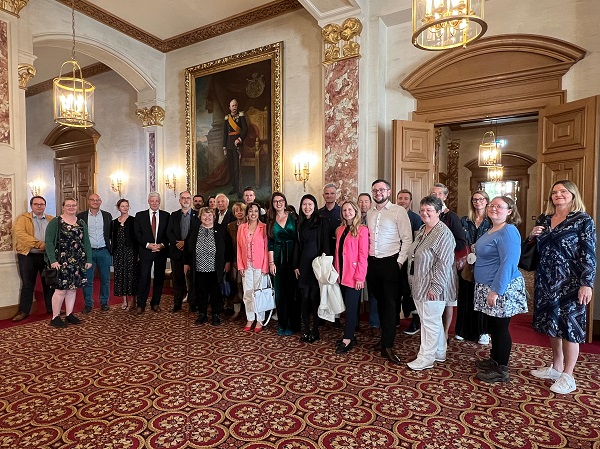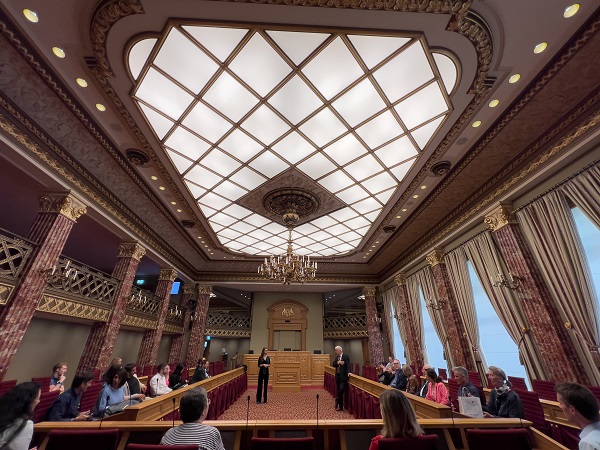 Credit: Ali Sahib
Credit: Ali Sahib
On Friday 10 June 2022, the Ireland Luxembourg Chamber of Commerce (ILCC), together with members of the Irish Club of Luxembourg (ICL), undertook a guided tour of the Chambre de Deputés, Luxembourg's Parliament building.
Geoff Thompson, representing both the Irish Chamber and Irish Club, welcomed members of both organisataions, as well as friends of Ireland, and thanked Clara Moraru for coordinating the event and arranging for Claude Wiseler, member of parliament (deputy) and leader of the CSV party, currently the main opposition party. Clara Moraru talked briefly about her role in helping the international community to engage more in political life, including standing as candidates in elections.
Claude Wiseler welcomed the 30-strong group and started the tour in the main lobby of the building, talking about the building's history and architecture. He recounted how Luxembourg had its first constitution in 1848 and the building was built in 1958. Since then, parliament has set there continuously apart from on three occasions: during World War II when it was commissioned for propaganda purposes by the Nazis, in 1999 during renovations, and during the recent COVID-19 pandemic (when parliament moved temporarily to the nearby Cercle Cité). He also revealed that, in 1999, serious consideration was given to moving parliament to a brand new, state-of-the-art parliament building to be designed and build in Kirchberg; however, the decision was taken to retain the same building and renovate it and also to purchase neighbouring buildings that would then provide additional space.
The building actually adjoins the Grand Ducal palace; however, the palace in over 200 years older; there is a connecting door from the parliament building to where the Grand Duke has his office in the palace.
Architecturally, the building has retained its 19th century style, even if some of the interior marble-like pillars are not indeed marble. Before the renovation it was fairly plain; now it is quite ornate. In the lobbies (on both the ground floor and first floor) hang portraits of former Grand Dukes, with one of the current Grand Duke hanging in the main chamber facing the Speaker of the Parliament.
Here, in the main chamber, there are 60 seats, one for each member of parliament (in addition to where the Speaker sits and the lectern / podium from where people address the chamber. He explained that the current government (a 3-way coalition between the DP, LSAP and Green party) has a slim 31-29 majority, with the CSV being the largest party. He also explained that one does not have to be elected to be appointed to a government post, as is the case with two ministers currently; however, only elected parliamentarians can vote. He also explained that if a member of parliament is to be replaced (e.g. they resign or die while in office), then no by-election is carried out; instead, the next person on the list in their constituency is appointed automatically.
All plenary sessions are on live television; there is also a public gallery which is open 99% of the time - it can only be closed for security or personal issues, e.g. when debating security or an individual. Translation (interpretation) is also available, but is only used for special procedures, e.g. if someone from another country is addressing parliament. Luxembourgish is now used all the time in parliament; French used to be the language used in the chamber, but this was gradually phased out until around 25 years ago.
All votes are public, there are no secret ballots: voting is done by individual touch screens, with parliamentarians allowed a maximum of one proxy.
Claude Wiseler fielded many questions from those attending, one of which asked if the number of parliamentary seats would increase since the population has increased significantly over recent decades. He responded that No, that would not happen, primarily as the number of seats is fixed in the constitution and it represents representing a percentage of the population, not a number of the population.

In response to another, he addressed the issue of half of residents not being able to vote in national elections: he referred to a referendum held around six years ago which was defeated; he did explain, however, how being able to gain Luxembourgish nationality was made easier, and therefore the right to vote in national elections (those living in Luxembourg for five years are automatically put on the voting list for local and European elections). Despite this, he acknowledged that sometimes members of parliament may not understand the issues of the international community. He admitted that it is a big challenge for the political parties to identify candidates from the international community. The issue of using English was also asked.
On the issue of petitions, he explained that 4,500 signatures are needed; if reached, the person/group who initiated the petition is invited to present the issue in parliament after which it is discussed.
Claude Wiseler also mentioned that he has a family connection, with his son living in Ireland for the past 15 years or so; he also knows a number of Irish politicians, including Leo Varadkar, currently Tanaiste and leader of the Fine Gael party (currently in coalition with Fianna Fail) which is in the same political grouping as the CSV party at a European level.
Isabel Wiseler-Santos Lima, MEP for Luxembourg and wife of Claude Wiseler, joined the tour; she also addressed the group about the European parliament and the importance of being involved in politics.
The event concluded with a reception at Hotel Francais.








